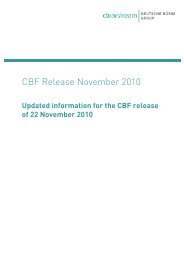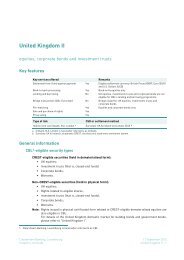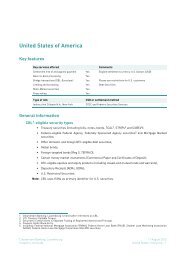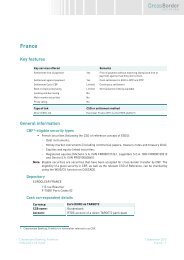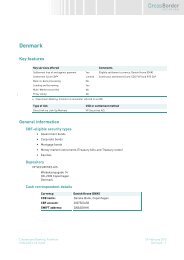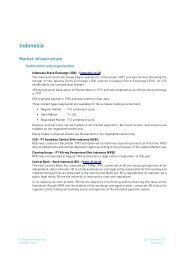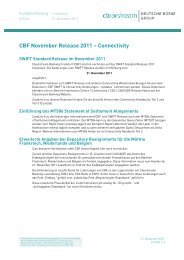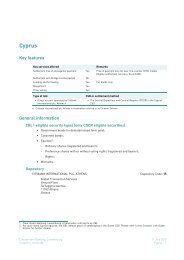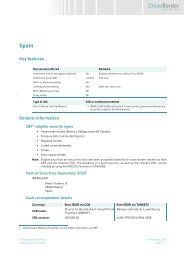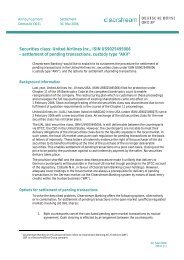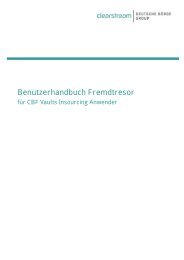An introduction to the European Post-Trade Market - Clearstream
An introduction to the European Post-Trade Market - Clearstream
An introduction to the European Post-Trade Market - Clearstream
Create successful ePaper yourself
Turn your PDF publications into a flip-book with our unique Google optimized e-Paper software.
unders<strong>to</strong>od, some believe that CSDs are always involved in <strong>the</strong> clearing and settlement of securities<br />
o<strong>the</strong>r than Eurobonds. However, this is not <strong>the</strong> case, as is illustrated by exhibit 8.<br />
Exhibit 8: Different ways <strong>to</strong> realise <strong>the</strong> transfer of ownership<br />
THE EUROPEAN POST-TRADE MARKET<br />
Competition, Efficiency, and Governance<br />
(A) Settlement internalisation (B) Settlement via CSD (C) <strong>Trade</strong> in securities held in<br />
individual safe cus<strong>to</strong>dy<br />
Seller Buyer<br />
Bank<br />
Seller Buyer<br />
Bank 1 Bank 2<br />
CSD<br />
Seller Buyer<br />
(A) Even if safekeeping of a security is centralised at a CSD, transfer of ownership between two<br />
cus<strong>to</strong>mers of <strong>the</strong> same bank (or cus<strong>to</strong>dian) can take place without a CSD. In this case, <strong>the</strong> bank can<br />
“internalise” <strong>the</strong> settlement of a trade by an internal booking from one cus<strong>to</strong>mer account <strong>to</strong> ano<strong>the</strong>r,<br />
and it assumes <strong>the</strong> clearing and settlement function regarding <strong>the</strong> cus<strong>to</strong>mers’ trades. 38) The number<br />
of banks that hold accounts with a CSD is ra<strong>the</strong>r small and has fallen in recent years due <strong>to</strong> <strong>the</strong><br />
consolidation and specialisation of <strong>the</strong> banking industry. Also, many banks have made significant<br />
investments <strong>to</strong> increase <strong>the</strong> number of internalised trades, <strong>the</strong>reby directly competing with exchanges<br />
and post-trade services providers. As a consequence, <strong>the</strong> share of internalised trades has increased. 39)<br />
The <strong>Market</strong>s in Financial Instruments Directive (MiFID) now provides a clear framework for internalisation<br />
and, in some markets (e. g. France), for <strong>the</strong> first time allows internalisation. This will increase<br />
internalisation fur<strong>the</strong>r. But even where cus<strong>to</strong>mers do not trade via an internalisation platform of a<br />
bank, <strong>the</strong>y very often settle through one bank or cus<strong>to</strong>dian and do not involve a CSD. For example,<br />
institutional trading parties – once <strong>the</strong>y have entered in<strong>to</strong> an OTC transaction – compare where <strong>the</strong>y<br />
maintain securities accounts. As <strong>the</strong>y all maintain accounts at various global cus<strong>to</strong>dians and ICSDs<br />
<strong>the</strong>y are highly likely <strong>to</strong> use one common institution for settlement. 40)<br />
(B) In <strong>the</strong> second case, <strong>the</strong> transfer of ownership involves a CSD. This is <strong>the</strong> case when <strong>the</strong> respective<br />
security is held for safekeeping at a CSD and <strong>the</strong> seller and buyer are cus<strong>to</strong>mers of two different banks.<br />
(C) In <strong>the</strong> third case, securities that are not held for safekeeping at a CSD are s<strong>to</strong>red privately or by a<br />
bank. In this case, transfer of ownership can take place ei<strong>the</strong>r by physical transfer of <strong>the</strong> security or<br />
by a book transfer by <strong>the</strong> bank safekeeping <strong>the</strong> security.<br />
38) Even if a CSD assumes <strong>the</strong> central safekeeping function for most securities, it is not always involved in <strong>the</strong> transfer of ownership. Every bank<br />
holds all its immobilised and dematerialised securities in a single “omnibus account” with <strong>the</strong> CSD, in which it books its own and/or its cus<strong>to</strong>mers’<br />
holdings. The ultimate owner, be it <strong>the</strong> bank itself or a cus<strong>to</strong>mer, is not recorded in <strong>the</strong> omnibus account. Thus, transfers among bank cus<strong>to</strong>mers<br />
or between <strong>the</strong> bank and a cus<strong>to</strong>mer do not require a booking at <strong>the</strong> CSD level.<br />
39) O<strong>the</strong>r examples for settlement internalisation are a) banks acting directly as sellers or buyers, building up and running down <strong>the</strong>ir own s<strong>to</strong>cks;<br />
b) netting on <strong>the</strong> books of an execution broker, clearing agent or cus<strong>to</strong>dian, which is not organised in a formal manner, but results directly from<br />
a market player offering such attractive execution/cus<strong>to</strong>dy services that it generates sufficient critical mass on its books (this could occur on any<br />
market); c) netting between <strong>the</strong> execution broker and <strong>the</strong> cus<strong>to</strong>dian, a situation that arises as a result of <strong>the</strong> takeover of a brokerage firm by a<br />
bank (e. g. Cortal, BNP Paribas) – <strong>the</strong> bypassing of <strong>the</strong> settlement system <strong>to</strong> transfer securities from <strong>the</strong> broker’s account <strong>to</strong> <strong>the</strong> cus<strong>to</strong>dian’s<br />
account depends on <strong>the</strong> interoperability of <strong>the</strong>ir systems and on <strong>the</strong> segregation of <strong>the</strong>ir clients’ assets.<br />
40) See NERA Economic Consulting, 2004, p. 73. Trading parties select <strong>the</strong>ir agent bank/cus<strong>to</strong>dian so as <strong>to</strong> avoid settlement via a CSD, thus<br />
saving costs.<br />
23



